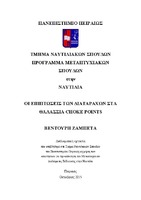Οι επιπτώσεις των διαταραχών στα θαλάσσια choke points

Προβολή/
Θεματική επικεφαλίδα
Θαλάσσιες μεταφορέςΛέξεις κλειδιά
Chokepoints ; Πετρέλαιο ; Αγωγοί πετρελαίου και φυσικού αερίου ; Oil ; Oil pipeline and natural gasΠερίληψη
Αντικείμενο της παρούσας διπλωματικής εργασίας είναι η μελέτη των
επιπτώσεων από ενδεχόμενες διαταραχές στην διέλευση από τα θαλάσσια choke points.
Αρχικά, δίνεται ένας γενικός ορισμός των choke points με ανάλυση των βασικών
εννοιών τους και μετά αναλύονται λεπτομερώς τα θαλάσσια choke points, όπως αυτά
επιλέχτηκαν με βάση την τεράστια σημασία τους στη μεταφορά αργού πετρελαίου, και
φυσικού αερίου και συγκεκριμένα τα στενά του Hormuz, του Malacca, η διώρυγα του
Suez, το στενό του Bab El Mandeb, τα στενά του Βοσπόρου και των Δαρδανελίων
(γνωστά στην ξένη βιβλιογραφία ως Turkish Straits), και τέλος το Κανάλι του Panama.
Στο δεύτερο κεφάλαιο, γίνεται μία εισαγωγή στην ναυτιλιακή αγορά και
παρουσιάζονται οι κύριοι θαλάσσιοι δρόμοι που ακολουθούν τα πλοία για την
μεταφορά πετρελαίου και πετρελαϊκών προϊόντων καθώς και υγροποιημένου φυσικού
και πετρελαϊκού αερίου. Στο επόμενο κεφάλαιο, γίνεται αναφορά στις αιτίες
διατάραξης της ασφαλής διέλεσης από τα choke points που δεν είναι άλλες από τους
γεωμορφολογικούς και φυσικούς κινδύνους, τους κινδύνους πειρατείας και την
πολιτική αστάθεια αυτών των περιοχών, με φόβο πρόκλησης πολεμικών συγκρούσεων.
Στο τέταρτο κεφάλαιο, αναλύονται οι επιπτώσεις από τις διαταραχές στα choke
points που έχουν επιλεχθεί για την μελέτη αυτή, σε γενικό και ειδικό επίπεδο, καθώς
επίσης βραχυπρόθεσμα και μακροπρόθεσμα. Τέλος, γίνονται μελέτες περιπτώσεων των
επιπτώσεων από διαταραχές στα στενά του Hormuz και του Malacca.
Στο τελευταίο κεφάλαιο, δίνονται εναλλακτικοί τρόποι μεταφοράς που δεν είναι
άλλοι από τους αγωγούς μεταφοράς πετρελαίου και φυσικού αερίου, καθώς και κάποιες
εναλλακτικές διαδρομές που αυξάνουν το χρόνο και το κόστος μεταφοράς. Έτσι,
πραγματοποιούνται δύο πραγματικές μελέτες περιπτώσεων παράκαμψης της διώρυγας
του Σουέζ και του καναλιού του Παναμά, υπολογίζοντας το κέρδος που έχει μια
πλοιοκτήτρια εταιρεία από την διέλευση από τα δύο αυτά στενά σε αντίθεση με το
κέρδος που προκύπτει από την παράκαμψη τους μέσω του Ακρωτηρίου της Καλής
Ελπίδας.
Συμπερασματικά, η τεράστια σημασία των θαλάσσιων choke points έγκειται στο
γεγονός ότι το 63% από τα 90,1 εκατομμύρια βαρέλια πετρελαίου που παρήχθησαν το
2013 ανά ημέρα, δηλαδή τα 56,5 εκατομμύρια βαρέλια / ημέρα μεταφέρθηκαν δια
θαλάσσης και το 53,2% της παγκόσμιας θαλάσσιας μεταφοράς διήλθε από τα
αναφερθέντα σε αυτή την εργασία chokepoints. Ακόμα, το ίδιο έτος τα πετρελαιοφόρα
πλοία αντιπροσώπευαν το 30% της παγκόσμιας ναυτιλίας με βάση το νεκρό βάρος
χωρητικότητας, σύμφωνα με τα στοιχεία από τη Διάσκεψη των Ηνωμένων Εθνών για
το Εμπόριο και την Ανάπτυξη (UNCTAD).


